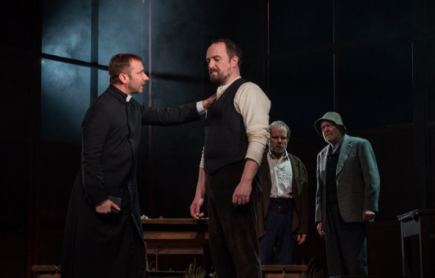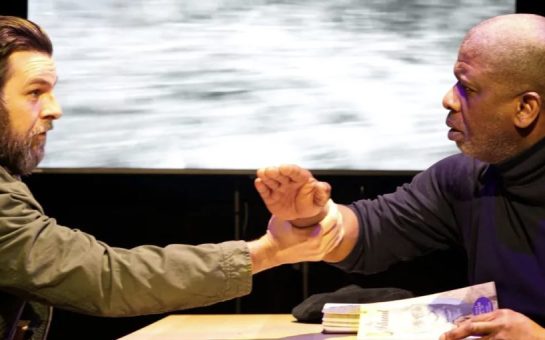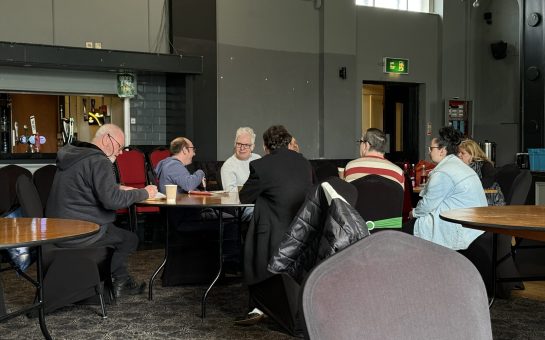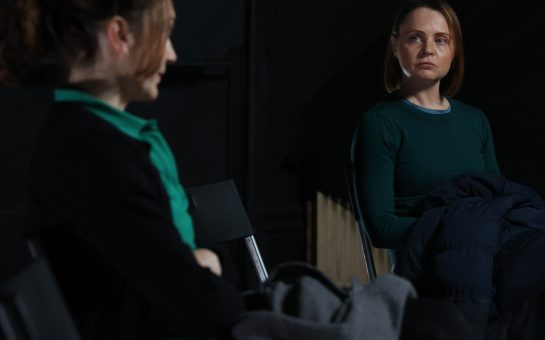According to director Douglas Rintoul, The Crucible is ‘the perfect play for our post-truth times’. Unfortunately, the initial promise of this idea is wholly submerged in a production that eventually flatters to deceive.
Arthur Miller’s iconic 1953 play uses the backdrop of the Salem witch trials to provide biting satire on the Army-McCarthy hearings of 1950s America, as free political and artistic expression were repressed by the US government.
At its best, The Crucible can appear timeless, offering intelligent and thought-provoking insight to any modern-day oppressor, as if Miller had written it with searing specificity to any age or government.
With this in mind, one could be forgiven for walking into Manchester Opera House expecting a piece of classic theatre that still rings true with every line – a reaction to the ‘Trump age’ and the new world of ‘fake news’.
Unfortunately, Rintoul’s production simply isn’t up to the task it sets itself.
For touring productions, there is some necessity to cast well-known faces and names and here we have Coronation Street’s Charlie Condou starring as the worldly Reverend Hale, brought in to rid Salem of the devil’s work, while Call the Midwife actress Victoria Yeates plays Elizabeth Proctor, the scorned wife of the play’s protagonist.
While this method of casting works for musicals, for comedy, and for pantomime, it remains to be seen whether it can be used successfully for classical theatre. One can’t imagine a production of Long Day’s Journey into Night starring Danny Dyer; we don’t expect to turn up to the theatre to see ‘Bill Roach as King Lear’; so why is this same respect not afforded to the plays of Arthur Miller?
This is not intended as a slight on Condou or Yeates, who in fact were two of the more impressive members of the ensemble – Condou bringing a measured authority to Hale while Yeates clearly understands the subtle torture of Goody Proctor as she comes to terms with her husband’s lechery.
However, to centre a production (as this one does) around these two relatively small parts jars terribly with a script which is ultimately all about its protagonist: John Proctor.
The buck for these decisions in casting, creative vision and promotion must ultimately stop with the producers and the director, as the actors were left with little scope to convey the weighty meaning of Miller’s text.
The production’s major problem lay in the characterisation of the tortured adulterer Proctor, played by Eoin Slattery.
Slattery’s performance lacked the nuance, torment and gravitas that the part of Proctor demands, and this confused and inconsistent portrayal meant that by the play’s devastating final act, Proctor had not earned the engagement necessary for the tragedy to strike true.
In a part previously inhabited by the likes of Daniel Day-Lewis, Richard Armitage and recently Ben Whishaw, the bar has been set high, and unfortunately it was simply not met in this production.
With this said, Slattery was by no means alone amongst the cast in falling short of the standard that has come to be expected of a professional ATG production.
 EXPECTATIONS: The show failed to live up to its promise
EXPECTATIONS: The show failed to live up to its promise
Cornelius Clarke struggled to find any subtlety in his portrayal of the angered and corrupt Reverend Paris, while David Delve was painfully hammy as the aged and stoic Giles Corey.
Again, much of the fault for these substandard performances must lie with the director, as must the bizarre use of lighting and tech throughout the production.
The whole point of The Crucible is that none of the girls are actually possessed by the devil, and yet at regular intervals the choreography, sound and lighting design seemed to encourage a reading of the play whereby the audience begins to buy into the girls’ pretence, as thunder crashes and backdrops flash white.
Perhaps this was the point, for the audience, like the judges, to be seduced by the lies of the vengeful Abigail Williams, but if this was the intention then again it was too confused and obscure to be fully understood.
One can easily gauge the level of an audience’s engagement with a production by the volume of the fidgeting in the auditorium, and it has to be said that (though only half-filled) by the fourth act, the fidgeting was frankly deafening.
The audience were bored and the applause at the end was more polite than it was uproarious.
In 2005, 50 years after its initial release, Miller commented that The Crucible is a play that ‘probably and unfortunately is not going to overwhelmed with irrelevance too soon’.
As the most frequently performed of all his plays, it has become almost ubiquitous in modern American theatre, and Miller was right – there are still moments in this production where his lines sing through with searing resonance.
But in Rintoul’s production, these moments are few and far between and the audience is ultimately left with a piece of theatre that, above all else, is simply misjudged.
*The Crucible is playing at Opera House, Manchester until Saturday, 12 May. You can buy tickets HERE.



